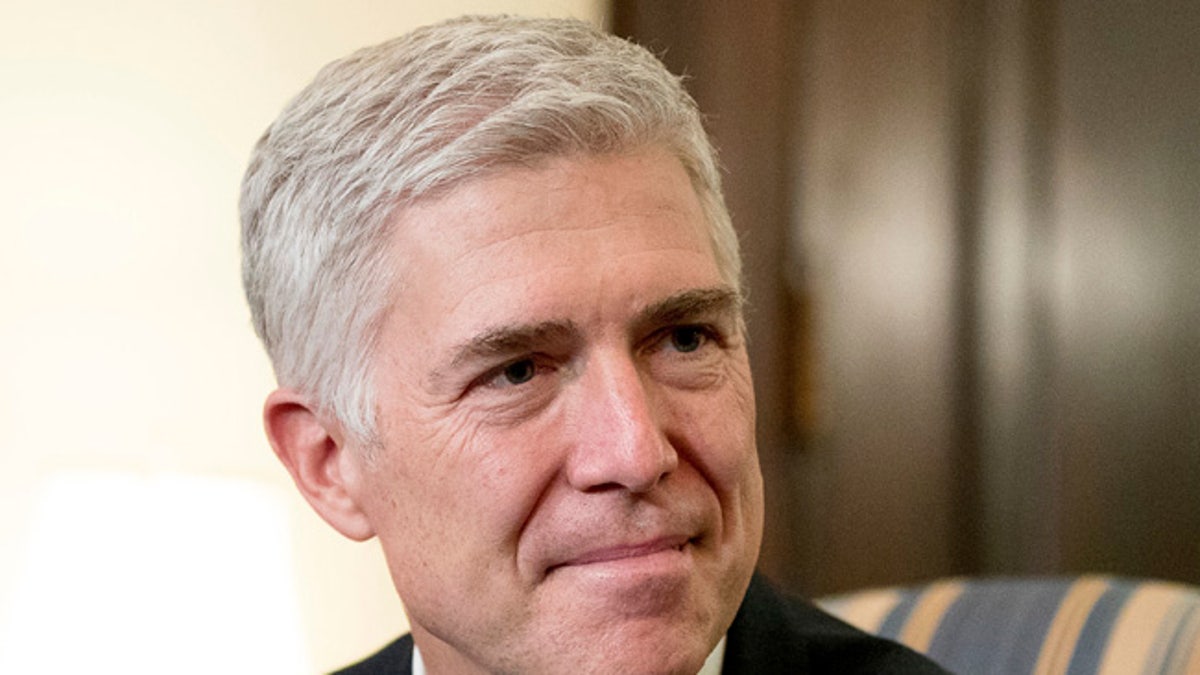
Supreme Court Justice nominee Neil Gorsuch meets with Sen. Chris Coons in Washington. (AP)
Monday, the American people will meet our probable next Supreme Court Justice, Tenth Circuit Court of Appeals Judge, Neil Gorsuch.
There is no question that Judge Gorsuch is exceptionally qualified. His background and character are unimpeachable.
The non-partisan American Bar Association has given him its highest possible rating. Even the Senator leading the charge against his nomination, Minority Leader Charles Schumer, has described Judge Gorsuch as “clearly very smart, articulate and polite, with superb judicial demeanor.”
Judge Gorsuch is also uniquely positioned to succeed the irreplaceable Justice Antonin Scalia. Like Justice Scalia, Judge Gorsuch believes in the rule of law, not judge-made law. He believes that the judiciary is vested only with the power to interpret statues, not create them. As Justice Scalia wrote, this distinction is critical because it determines who governs: an unelected committee of judges with life tenure or the people’s representatives.
The last four nominees to the Supreme Court have all been confirmed by comfortable margins. And since the balance of the Court will not change by the addition of Judge Gorsuch, he normally would sail through a confirmation hearing.
This political season is anything but normal, however. The Democrats are still smarting over their unforeseen loss of the presidency and over Judge Merrick Garland’s failed nomination. They’ve already worked publically to discredit Judge Gorsuch and have even previewed their attack on the nominee.
Just last week, Senator Schumer took the unprecedented step of holding a pre-hearing press conference to attack the nominee. Judge Gorsuch, Senator Schumer claimed, “harbors a right-wing, pro-corporate, special-interest agenda.” He accused the Judge of being in the pocket of billionaires and siding with corporate interests at the expense of the every man.
Senator Schumer has a big imagination. Judge Gorsuch’s record speaks for itself. But sadly, the Senator’s comments are par for the course.
It was not so long ago that America was first introduced to another nominee, Chief Justice John G. Roberts. As a young attorney, I had the honor of helping him prepare, in a very small way, for those hearings. I can remember like it was yesterday sitting in the hearing room, as senator after senator tried to discredit then-Judge Roberts. I can remember the sharply worded questions, the insinuation that he, too, was all about big business, the attempted repudiation of his decades-worth of public service. (None of this was successful, of course.)
I also remember a photo that was splashed across the front pages of the newspapers. The soon-to-be Chief Justice was looking out from behind the half-closed doors of a mini-van. This was obviously not a planned photo-op, and yet, the American people loved that picture. From it, they could see that this highly qualified, erudite, and well-spoken judge was also human. He was a husband. He was a father. And, yes, on occasion he drove a minivan.
The American people can and should be concerned about Judge Gorsuch’s judicial philosophy. The way a judge thinks about judging matters. Is he or she someone who feels constrained by the words Congress has written? What about the Constitution? Is he or she a believer in original meaning of someone who believes that the Constitution is living, evolving even?
During their press conference, Democrats complained bitterly about Judge Gorsuch’s failure specifically to answer their many questions. But Senator Schumer should know better. He is no newcomer to Supreme Court nominations, having served on the Judiciary Committee for years. As such, he is very familiar with the so-called “Ginsburg Rule.” This rule preserves judicial impartiality by preventing judicial nominees from commenting on potential issues. As then-Senate Judiciary Chairmen Joe Biden explained at the beginning of Justice Ginsburg’s hearing, a nominee must not comment about “any specific case that may come before her.”
Justice Ginsburg also clearly indicated that she would not comment on potential matters in her introductory statement:
A judge sworn to decide impartially can offer no forecast, no hints for that would show not only disregard for the specifics of the particular case, it would display disdain for the entire judicial process.
Justice Ginsburg made good on that promise. She deflected well over thirty questions from senators on both sides of the aisle on issues ranging from the First Amendment, to the death penalty, to Roe v. Wade, to the Speech and Debate Clause, to antitrust law. She reminded the senators that asking for a signal on a potential case “is something you must never ask a judge to do.” Every nominee to follow has invoked the “Ginsburg Rule” and refrained from answering questions that implicate issues that might come before the Supreme Court.
The high theatre of a Supreme Court confirmation hearing is about to commence. When the senators doggedly insist upon more fulsome answers to questions—and they will—keep in mind that their questions may violate the Ginsburg Rule.
One hopes that the hearings will be civil. But if they are not, and all indications suggest that Democrats have no intention of making them so, it is worth remembering that Judge Gorsuch is also a husband, father, and son. The senators must do their due diligence, but as anyone with a toddler knows (I’ve got two), the tone matters.
In a country so divided, the last thing people want to see is politics as usual. Indeed, Supreme Court nomination hearings should be the epitome of civility. They should be a learning opportunity for the American people. Given the full-court press by Democrats, we’re likely to see politics as usual on full display Monday.
But one can hope.








































